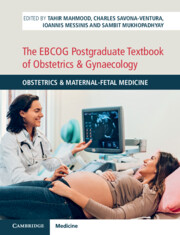Book contents
- The EBCOG Postgraduate Textbook of Obstetrics & Gynaecology
- The EBCOG Postgraduate Textbook of Obstetrics & Gynaecology
- Copyright page
- Dedication
- Contents
- Contributors
- Preface
- Section 1 Basic Sciences in Obstetrics
- Section 2 Early Pregnancy Problems
- Section 3 Fetal Medicine
- Section 4 Maternal Medicine
- Section 5 Intrapartum Care
- Section 6 Neonatal Problems
- Section 7 Placenta
- Section 8 Public Health Issues in Obstetrics
- Chapter 65 Social and Cultural Aspects Affecting Pregnancy Outcomes in Migrant Populations
- Chapter 66 Immunization in Pregnancy
- Chapter 67 Saving Lives, Improving Mothers’ Care
- Chapter 68 Clinical Governance in Obstetric Practice
- Chapter 69 Ethical Issues and Conflict in Maternal-Fetal Medicine and Obstetrics
- Chapter 70 Legal Considerations in Obstetric Practice
- Chapter 71 Research and Audit in Obstetric Practice
- Section 9 Co-Morbidities during Pregnancy
- Index
- Plate Section (PDF Only)
- References
Chapter 71 - Research and Audit in Obstetric Practice
from Section 8 - Public Health Issues in Obstetrics
Published online by Cambridge University Press: 20 November 2021
- The EBCOG Postgraduate Textbook of Obstetrics & Gynaecology
- The EBCOG Postgraduate Textbook of Obstetrics & Gynaecology
- Copyright page
- Dedication
- Contents
- Contributors
- Preface
- Section 1 Basic Sciences in Obstetrics
- Section 2 Early Pregnancy Problems
- Section 3 Fetal Medicine
- Section 4 Maternal Medicine
- Section 5 Intrapartum Care
- Section 6 Neonatal Problems
- Section 7 Placenta
- Section 8 Public Health Issues in Obstetrics
- Chapter 65 Social and Cultural Aspects Affecting Pregnancy Outcomes in Migrant Populations
- Chapter 66 Immunization in Pregnancy
- Chapter 67 Saving Lives, Improving Mothers’ Care
- Chapter 68 Clinical Governance in Obstetric Practice
- Chapter 69 Ethical Issues and Conflict in Maternal-Fetal Medicine and Obstetrics
- Chapter 70 Legal Considerations in Obstetric Practice
- Chapter 71 Research and Audit in Obstetric Practice
- Section 9 Co-Morbidities during Pregnancy
- Index
- Plate Section (PDF Only)
- References
Summary
Obstetric research is vital. It provides insights into normal physiological responses of the body, the impact of pathology on those responses and understanding about how to diagnose and treat disease.
- Type
- Chapter
- Information
- The EBCOG Postgraduate Textbook of Obstetrics & GynaecologyObstetrics & Maternal-Fetal Medicine, pp. 576 - 586Publisher: Cambridge University PressPrint publication year: 2021



